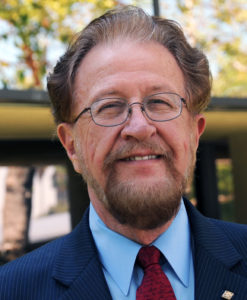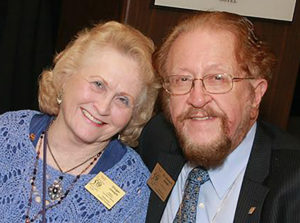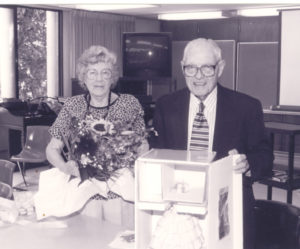Celebrating the Past: Looking to the Future
By the Rev. Dr. Laverne R. Joseph
Reprinted with permission from RHF Today.

As many of you have heard, I will be retiring at the end of February. I have worked well beyond what is considered normal retirement because I have enjoyed it and observed the difference that the RHF mission makes in the lives of so many people.
I do believe in Providence. I never set out to pursue this career.
Some of you may have heard me tell the story of how when I was in grade school I started taking piano lessons because that’s what my friends were doing. So at seven in the morning, before school started, I went to a music teacher’s studio where she would sit on the bench beside me. She was also the organist at a local church. After several years one morning she said, “You are getting quite good, you ought to become a music teacher and church organist. Have you ever thought about that?” “No,” I replied. “Well, what do you want to do when you grow up?” she asked. I replied, “A race car driver or truck driver.”
She almost fell off the bench.
But my involvement in music continued. My family attended church every Sunday and I became the children’s church school accompanist and then later the adult church school accompanist. I was President of the Youth Fellowship. And I was also very involved in music in Junior and Senior High School. I became part of a jazz band led by an upper classman. When he graduated I became the leader of the band. We played all over central Pennsylvania. My favorite was our 19-piece band and vocalist.
One evening in my junior year before a program at the York Pennsylvania Country Day School, I stopped to visit my pastor because my parents were there. He asked, “What are you going to do when you graduate?” I replied, “I’m going to take my band on the road.” He said, “You ought to consider going to College and Seminary and becoming a pastor.” I had not thought of that but I took it seriously and applied to Ursinus College in Collegeville, Pa., near Valley Forge, where my cousin was a student. I was accepted as a history major and again became involved in music, as accompanist and student conductor of the traveling Meistersinger’s Choir, Student Conductor of the Concert Band and Orchestra and Marching Band. Every December, we would perform Handel’s “Messiah” with a chorus of 250 students, soloists from the New York Metropolitan Opera, and our own orchestra with additional musicians from the Philadelphia Orchestra.
In my senior year the head of our music department said to me, “I am going to be retiring in a few years. You ought to go to Penn State and get a music degree and come back as my successor.” I thought about that but decided to enroll in Lancaster Theological Seminary instead.

I took an intern year in campus chaplaincy at Southern Illinois University in Carbondale and during that year, Ginger and I met. We were married just before I began my last year in seminary.
After graduating, I was ordained as a United Church of Christ minister and we went to Chicago, where I enrolled in an ethics and society graduate program at the University of Chicago Divinity School. I was going to get a doctorate and return to Pennsylvania.
We started attending Peace Memorial Church, which was near Ginger’s teaching position at Calumet High School. We sang with the choir and then Dr. Ralph Ley asked me to preach a Lenten service sermon and afterwards he and his wife, Ruth, invited us to enjoy refreshments and conversation. During that time, he asked me to become the assistant minister to help on Sundays and to serve as pastor when he was traveling. He served on several college and seminary boards and travelled frequently. We would be compensated with an apartment in the church building and $100 a month.
After a number of months, Dr. Ley was called to serve as the Wisconsin Conference Minister and the Church and Ministry Committee asked me to serve as interim pastor, which I agreed to do. I told them I would stay if the new senior pastor wanted me to but I would be happy to give up the positon because I was still studying at the University.
Three weeks later they came back and said, “We changed our minds. We want you to be the senior minister. So two years after seminary, I had one of the largest churches in the United Church of Christ and was also the executive director of a Skilled Nursing Home which the church had founded. The congregation had about 1,200 members and a 100-bed Skilled Nursing Facility, which we expanded to 242 beds. We also bought a 76-acre farm in the suburbs and broke ground for a new church building and a retirement community.
During my time there, I also served on the Board of Evangelical Health Systems, now known as Advocate, and twice chaired the Board when it grew from two hospitals to five; and now it is the largest provider of health care in the Midwest.
I believe in providence. I gave Peace Memorial a five-year commitment and stayed 21 years.
One day, I asked our program coordinator, Louise Smith (who worked until well in her 90s), if she knew why the Church and Ministry Committee changed their mind. She said, “Sure, it was the German Ladies Guild” for whom I did a devotional every month. She said they went to the Church and Ministry Committee and said, “We like this young man. We ought to give him a chance.” And because of that I became the senior pastor and, ultimately, the president and CEO of RHF.

I have never sought a position but in retrospect, I have found that every positon I had prepared me for the next one. Due to my ministry with Peace Memorial Church and Evangelical Health Systems (EHS), I became familiar with the United Church of Christ Council for Health and Human Service Ministries (CHHSM). My service with EHS was term limited, and when my service on their Board was completed I was asked, in 1986, to serve on the National Board of Retirement Housing Foundation. One day the Board Chair, Rex Chapman, called and said he would be coming to Chicago and wanted to talk with me. That is when I was asked to succeed the Rev. Clark Harshfield as president & CEO of RHF.
In July of 1987, my family and I moved to Long Beach, Calif., to begin my role as president & CEO.
At that time, RHF had 65 communities in 15 states. Now, we have 198 communities in 29 states, the District of Columbia, Puerto Rico and the Virgin Islands. From time to time, I look at the pictures in the boardroom. There are Rev. Clark and Verna Harshfield, Rev. Reinhold and Lydia Klein. Steve Pilibos, the rancher farmer, who served as the third incorporator. Palmer Conner, who provided some of the initial funds together with our three founders.
There’s Ernie Frank, Merrill and Lucile Whitter, Tom and Yuri Masuda, Jean Dremstedt, Rex and Gertrude Chapman, Rev. Dr. John and Shirley Trnka, Bill and Jean Warrick, Hal and Melody Schultz, Teri and Kiku Kawata, Bill and Buni Radar, Nancy and Dailey McPeak, Don and Mary King. All played an important role in Retirement Housing Foundation and many of them are now a part of the Church Triumphant.
RHF’s mission is definitely needed. While we have over 22,500 residents, we have over 43,000 persons on our waiting lists. Housing is a basic need. If you don’t have a decent affordable place to live, other goals in life are extremely difficult to achieve. In addition to our affordable housing for older adults, families and persons with disabilities, we also have skilled nursing and assisted living.
Although LeadingAge former President and CEO Larry Minnix used to say that I would be the only CEO to serve until I was 100 years old, it’s time to make a transition. I wish all the best to our Board of Directors, team members, to all of our residents and to our incoming CEO Stuart Hartman, who has served for many years with RHF, as together you work to make the basic needs of life a reality for so many people.
May God Bless you in this great mission.
Join Our Mailing LIst
Follow on Facebook
Iredell Adult Day Services Hosts Ribbon-Cutting to Celebrate Adult Day Health Certification - CHHSM
www.chhsm.org
Iredell Adult Day Services (IADS) in Newton, N.C. — a nonprofit organization dedicated to caring for older adults, vulnerable groups, and their families, and part of EveryAge — hosted a ribbon cut...